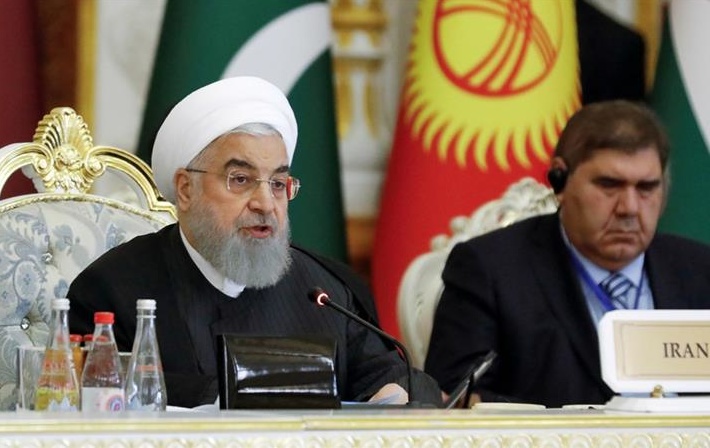Iran’s President Hassan Rouhani speaks at the Conference on Interaction and Confidence-Building Measures in Asia, Dushanbe, Tajikistan, June 15, 2019 (Mukhtar Kholdorbekov/Reuters)
President Hassan Rouhani has warned again that Iran will suspend its adherence to parts of the 2015 nuclear deal with the 5+1 Powers (US, UK, France, Germany, China, and Russia), if Tehran does not receive political and economic support against the “maximum pressure” of the Trump Administration.
Rouhani said at a conference in Tajikstan on Saturday that Iran still believes the remaining powers in the deal — the Trump Administration withdrew in May 2018 and imposed comprehensive sanctions on Tehran in November — can bolster regional and global stability. He noted that Iran’s compliance with the agreement’s has repeatedly been verified by the International Atomic Energy Agency.
Q&A: How Serious is Iran-US Confrontation After Tanker Attacks?
EA on BBC: Iran, the US, and the Tanker Attacks
But he chided, “Other countries also need to pay their share to save this important agreement,” and then issued his warning:
Now that our utmost goodwill and strategic patience in one hand and the US violation of law on the other hand have been proven to everyone, the Islamic Republic of Iran has decided to reduce its commitments based on Articles 26 and 36 of the JCPOA [Joint Comprehensive Plan of Action] to restore balance to the agreement while being ready for any interaction.
If we don’t receive a proper response, we will inevitably take further measures.
Iranian officials said last month that they would begin quadrupling production of low-grade 3.67% uranium from July 7, if other powers did not establish economic links with Tehran to bypass US sanctions.
The European Union launched a limited Special Purpose Vehicle in February, but Iran rejected the mechanism, known as INSTEX, because of “humiliating conditions” — the EU’s concern over Tehran’s missile program, its activities in the region, and alleged bomb and assassination plots in Europe.
On Saturday, the EU’s deputy foreign head Helga Schmid held talks with Iran’s Deputy Foreign Minister Abbas Araqchi in Tehran. Before arriving in Iran, Schmid visited the UAE, Oman, and Qatar.
The UAE Foreign Minister, Sheikh Abdullah bin Zayed, called on Saturday for all sides to step back from conflict:
We must work together to spare the region from escalation, and give the voice of wisdom a chance.
The UAE — accused by Iran of working with Saudi Arabia to stage a “false flag” attack on two tankers on Thursday — and Tehran have been embroiled in a Twitter spat.
Iran’s Foreign Ministry accused the UAE of being a “milking cow” for the US, after UAE Minister of State Anwar Gargash said Iranian Foreign Minister Mohammad Javad Zarif was becoming “more farcical and losing credibility”.
Iran Daily, June 15: A Cautious World Watches as US Considers Action
Saudi Arabia’s Crown Prince Mohammed bin Salman, in his first comment on the explosions that damaged the tankers in the Gulf of Oman, said, “We do not want a war in the region…. But we won’t hesitate to deal with any threat to our people, our sovereignty, our territorial integrity and our vital interests.”

